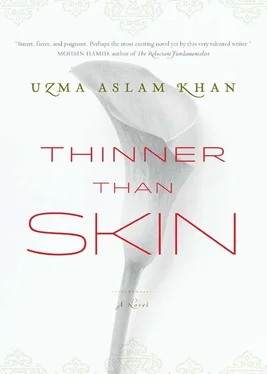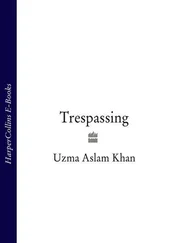Anger began to well in Maryam’s chest, as she continued staring at the raindrop at the tip of the leaf. If the government knew these men trained in the camps near Balakot, or down in Mansehra, or even as far as Swat, why not get rid of the camps? It was a question she heard the men ask too, as she listened through the wall, their anger almost as bitter as hers when their talk turned to the two missing boys. So much security and the boys had still not been found? Who had taken them, and why? Enemy suspects: buffalo herders? Keepers of stupid Australian sheep?
Maryam was not going to lose a second child. Was keeping Younis here a way of losing him? Was sending him away, with Ghafoor, a way of keeping him? It seemed the only options that presented themselves brought her right back to the dilemma voiced by everyone around her now. No matter what they did, they would neither be dry in the sun, nor wet in the rain.
The buffalo pulled the leaf that held the raindrop. She caught the drop with her long, purple tongue, her focus still on chewing. “Drink well,” said Maryam. “Eat well too.”
Behind them grew a cluster of wild pistachio trees, one of the most beloved trees in the forest. In late winter would bloom a mass of flowers the color of red dirt. It was a blessing, the way the color lit the freezing air. To Kiran, it had been a sign of an order she trusted in completely. Upon finding them each February, she would smile, but not once did she ever point. (It would take a special kind of jihad to enforce pointing.) And every September, soon after they returned from the mountains, when the red nuts had matured to blue, all the children of all the returning deras would shake the trees, gather the nuts, and carry them home to salt.
This September, Kiran would shake the trees from a different place. Maryam sank her face in the filly’s, and breathed. Over the years, she had cured the coughs of all her children with the tissues of pistachio bark. Now she inhaled the scent of the filly — a fresh manure scent, with hints of wood and incense — and wondered if she could cure the mother too. But of which malady? She smiled, still buried in horsehair. And which mother — the one on two legs or four?
Loi Tara had eaten enough. She raised her head, remembering her stubborn mother. “What should we bring her?” asked Maryam, still untangling that thicket of forelock with the fingers of her left hand. Loi Tara exhaled into Maryam’s stomach. She could feel the warmth through her rain-soaked kameez. She wondered, vaguely, if they should go deeper into the forest, to meet her husband. He would be bringing the rest of their herd back to the homestead. Jumanah would be with him, and Maryam could untangle her hair for a while, instead of Loi Tara’s.
She pulled Loi Tara gently back toward the hut. The rain fell as a series of ruthless barriers, pushing them back as they pulled ahead. They moved in stages, breaching one watery wall, pausing beneath a tree, and charging forward again, into a thicker, heavier wall. She could barely see where they were headed, yet there were others in the forest too, she could sense them, navigating their way through a world of fences, both solid and liquid, singing softly to their cattle, whose bells she had been hearing the entire time the filly fed. The sound was so known to her she could forget to notice it.
On she walked, keeping the rhythm that out-tricked the rain, a rhythm that was almost enjoyable, like a game. She hoped there would be no floods this year. They had endured enough. She hoped the glaciers would behave, and not gallop down the mountain slopes to block their roads and break their bridges. There was nothing more worrisome than a glacier that looked around and decided it no longer wanted to mate and melt gradually, but instead, to run like a horse. You could harness a horse but not a Gujjar — or a glacier.
On she went, in the rain, in the shelter of her game, her thoughts. Through the wall at night, no one had mentioned Ghafoor again, not since the time they had laughed at him. She had even been to the shrine clandestinely at night, risking being caught by the uniforms or skullcaps or both, in the hopes of finding him there. Or finding something — a feather, a cloth. But she found nothing, except the two flowers, crisp to the core. It was unlike him. If he said he would let her know what happened, he would let her know. Perhaps nothing had happened. Or perhaps … If the men were looking for him, had his plan changed? Where was he? Perhaps she ought to pray for him, if only in her heart, because during the day, she kept away from her shrine. Her husband insisted that under no circumstances was she to go anywhere near it. So she never again uncovered the box with Kiran’s jewelry and two milk teeth, the one she had wrapped in red cloth. She said a quick prayer over the place where it lay buried, and let it rest.
In truth, she did not need signs from Ghafoor any more, at least not to tell her where they were. She knew. She continued to see them, there at the foot of the mountain, moving toward the serrated brown rock. But each time the man lifted his foot and began the climb, Maryam’s vision would fade. One minute he was approaching the mountain, the next, he was trapped. In between, there was rain, goatbells, and that low chorus of singing and lowing.
Maryam halted abruptly. They were perhaps two hundred feet from the homestead when she realized she was also listening to something else. Loi Tara heard it too, she could tell by the way the filly pulled nervously back. A commotion, a rumble — of voices, or thunder? A landslide? An earthquake?
She could hear a scream, followed by a whole chorus of screams.
A ripple of fear pulsed down the filly’s back. More screams, and wailing too. From two deras away. Not Laila’s family, but the family next to hers. They were in distress, and what was Maryam doing? Listening from afar while stroking Loi Tara? Is this how she repaid the kindness of those who had sacrificed their summer in the highland to return to the plains with her family, in her time of grief?
Maryam pulled Loi Tara toward something heavy and familiar in her gut. If she had to name it, she would name it death, and a whole universe of pain that never existed before death, until, it simply did.
They had found one of the missing boys in his family’s waterhole. The rain filled the hole and he rose to the top and his bloated limbs nearly spilled over the edge of the trough. But they did not. He bobbed in the slime-gilded pool with mango peels and goat entrails. Petals of eritrichum littered his hair. In the sky, a murder of crows. On the ground, too many men and women to let Maryam through. Yet, within moments, she held the history of the boy’s young life in her flesh while her eyes reflected what others would see. His arms and legs were broken, hands burned, buttocks slashed, and a portion of his head crumpled like an aluminum can stamped on by a horse. From this wound a stream oozed into the waterhole; that was not the blood nor bile of a goat. He was recognized by the chain around his neck, a present from a rich relative that appeared to have helped choke him.
Maryam froze. She recalled the two boys seen several days ago while she hid in the forest with Laila. One boy had been scratching the dirt with a broken slipper. The other had been wearing a chain. She remembered the second one inviting a group of men into a hut. She remembered the red pom-poms.
The second boy was not found. It was his mother who cried the loudest. The one whose son was being dragged out of the waterhole did not cry. She was cursing God so loudly, eventually she had to be slapped into silence. It was a silence that would last the rest of her life.
Meanwhile, the valley talked. It was a talk that began as a murmur and grew and grew. The boys had been taken “for information.” They were “enemy suspects.” They had been taken by plainclothesmen. No, they had been taken by uniforms. Laila said they wore turbans and expensive slippers. Maryam said the slippers had pom-poms. Still others said they were taken by men last seen on the banks of the Kunhar, smuggling trees, in expensive slippers. They were from the camps. No, others insisted, they had come down to the plains from the mountains. No. They had come up to the plains from hell. No, it was the mountains. Which? The mountains to the east. No, the ones to the west. And it seemed to Maryam that those doing the talking kept growing in number, and included both plainclothesmen and men in uniform, and were from the government and from the camps, from the mountains and from hell.
Читать дальше












